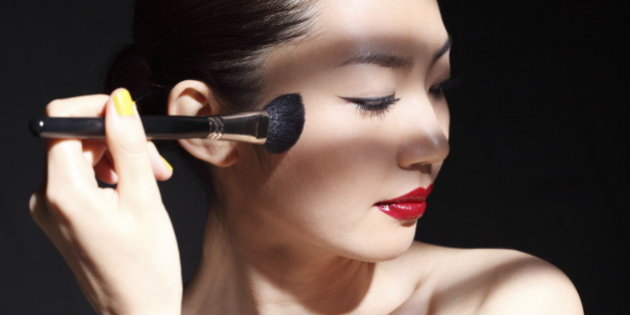South Korean women are destroying cosmetics and cutting their hair short to fight back against unrealistic beauty ideals in what is being dubbed the "escape corset" movement.
韩国正在掀起一场名为“逃脱束缚”的运动,许多韩国女性毁掉化妆品、剪短头发,以此抗议对美不切实际的追求。
In posts across Instagram, Twitter and other social media platforms, women have been denouncing the use of cosmetics and a culture that pressures as many as one in three women to undergo some form of plastic surgery.
韩国女性在Ins和推特等社交媒体平台上发帖,反对使用化妆品,并且对迫使多达1/3的女性接受了不同形式的整容手术的文化氛围进行抨击。
Beauty regimens commonly require women to spend hours applying makeup each day – often involving waking up two hours before work to do so or carrying out lengthy skincare routines that involve 10 steps or more at the end of each day.
在韩国,女性通常每天要花好几个小时化妆,每天上班前要提前两个小时起床化妆,每天睡觉前还要进行冗长的护肤程序,一般有10个以上的步骤。

The "escape corset" movement is the latest development in the Asian country's exploding feminist movement in the age of #MeToo, in a country that was ranked a poor 116 out of 144 countries on gender equality by the World Economic Forum.
“逃脱束缚”是#MeToo时期韩国爆发的最新一次女权运动。根据世界经济论坛的排名,韩国的性别平等状况在144个国家中排名第116。
The women abandoning demanding cosmetic regimens call themselves "beauty resisters" and are part of a broader pushback against South Korea's highly patriarchal society which places a huge emphasis on a woman's appearance as being key to success in life.
放弃了耗时耗力的美容习惯的女性称自己为“美丽抵抗者”,这也是她们为抵制韩国高度男权的社会而付出的努力的一部分。韩国社会一直强调女性的美丽外表是人生成功的关键。
Stories about young women transforming their lives after having plastic surgery and makeovers are abound in soaps and movies, and popular on reality TV.
年轻的韩国女性在整容和化妆后过上更好生活的故事频频出现在肥皂剧和电影里,在真人秀节目中也颇受欢迎。
South Korea has a massive beauty industry and in 2017 it was estimated to be worth just over 10 billion pounds, according to retail researchers Mintel.
根据英敏特市场咨询公司的数据,韩国的美容产业非常庞大。2017年,其美容产业估计价值超过100亿英镑。
Seoul is the global plastic surgery capital and the wealthy neighborhood of Gangnam reportedly has 500 aesthetic centers.
首尔是全球的整容之都。据报道,富裕的江南社区有500家美容中心。













